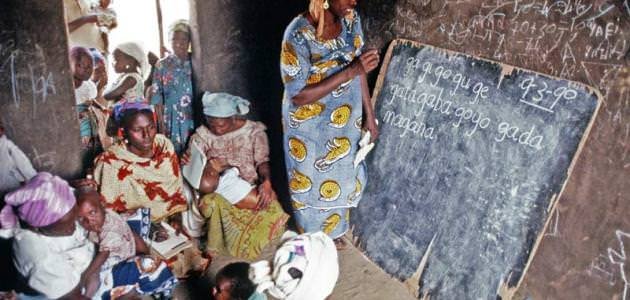
Illiteracy The importance of science stems from the saying that "science is light", it expands the horizons and perceptions of its owner, increases its culture, develops its information and gives it the power of knowledge. Science is not limited to one type of science, but it is different forms of knowledge and information. At present she suffers from illiteracy or illiteracy. Definition of Illiteracy The United Nations defined illiteracy as the condition of a person who can not read and write, and in 1971 issued another definition that states: "Every person who has acquired the necessary information and abilities to practice all activities in which knowledge of the language is necessary to play his role effectively in his community , And achieves literacy and numeracy results that enable him to elevate himself and his community and allows him to participate actively in the life of his country. [1] The illiteracy is a societal phenomenon with negative effects spread in many countries across the world, In the early primitive societies, illiteracy was related to literacy, like the majority of developing countries and third world countries. At present and in developed societies, the standards of illiteracy have multiplied and there are several skills that are considered illiterate, On access to and use of data by different sources of knowledge or so-called information culture, which is concerned with developing a complex skill set that allows individuals to test, experiment and understand the flow of ideas through change (3) is the first verse revealed to the Prophet Muhammad, peace and blessings be upon him, as God Almighty swore in his book with the pen: (n) and pen And what they invoke), [4] what the section was only to show its magnitude and importance in a nation where learning to write is rare. (6) Reasons for Illiteracy Today, 17% of the world's population is illiterate, and two-thirds of the world's population is illiterate. This is the ratio, and there are 122 million young adults in the world, 60.7% of whom are women. The number of children who are out of school and are a source of concern for the future is 67.4 million. [7] This social scourge has several causes, including: [1] [8] the low level of education for parents. The existence of learning disabilities, such as dyslexia, difficulty and slow learning. The lack of laws and regulations that obligate schools to enroll in non-educated schools, in addition to the lack of seriousness in implementing these laws, if any. Some societies have been influenced by customs and traditions that prevent women from participating in public life, including exercising their right to education. The lack of justice in the distribution of public services in different areas of the country, and this often results in the access of urban people to better educational services compared to those living in the village or Badia. Effect of the efficiency of teachers who teach the first grades on the achievement of these students. Failure to take care of the rehabilitation of specialized teachers to educate the elderly. Political instability and ongoing wars and migrations in some countries. Children do not complete their education when they reach a certain educational stage and leave them to study for a variety of reasons, including the difficult social and economic conditions of the parents, forcing the child to leave school and join the labor market. The increasing number of people requiring more services, including education facilities, and in the event of a weak economic potential of the state, it will not be able to meet these needs. There is no correlation between the outputs of academic education and their employability in vocational education. Students evade classes. The effects of illiteracy In light of the efforts exerted to combat illiteracy and the high attention paid to this phenomenon, it was necessary to clarify the effects of this phenomenon and its dangers on society: [9] Parents who suffer from illiteracy do not appreciate the importance of their children receiving a great deal of education, Or their suffering for many problems in their studies or behaviors because there is insufficient attention from parents. Illiterate people suffer from a lack of confidence in themselves, as well as a lack of faith in their potential and abilities, which reduces their independence and access to the personal rights provided by the laws of the state, increasing the possibility of being deceived because of their lack of awareness and knowledge. The impact on per capita income, where low-educated individuals receive lower and lower quality education opportunities, making them more vulnerable to poverty. Ways to Reduce Illiteracy Governments and organizations devote considerable efforts and resources to combating and overcoming illiteracy by: (1) developing specialized programs through which teachers are trained to acquire the necessary professional and educational skills. Eliminate customs and traditions that prevent access to education opportunities. Involvement of social bodies. Media is an important means of informing the community about the importance of education and the advantages and opportunities it entails. Re-design adult education curricula that suit their interests. Provide incentives for the learner. Work on the development of other types of non-formal education. Countries that are concerned with education, renunciation and elimination of ignorance are among the most important and developed countries. Progress is measured by science and work.
http://mawdoo3.com/%D8%A8%D8%AD%D8%AB_%D8%B9%D9%86_%D8%A7%D9%84%D8%A3%D9%85%D9%8A%D8%A9
This is the best post on Steemit. I gave you a vote now, ya heard?
thanks for reading
شكرا للمشاركة .
حصلت على تصويت تشجيعي من
@arabsteem curation trail !